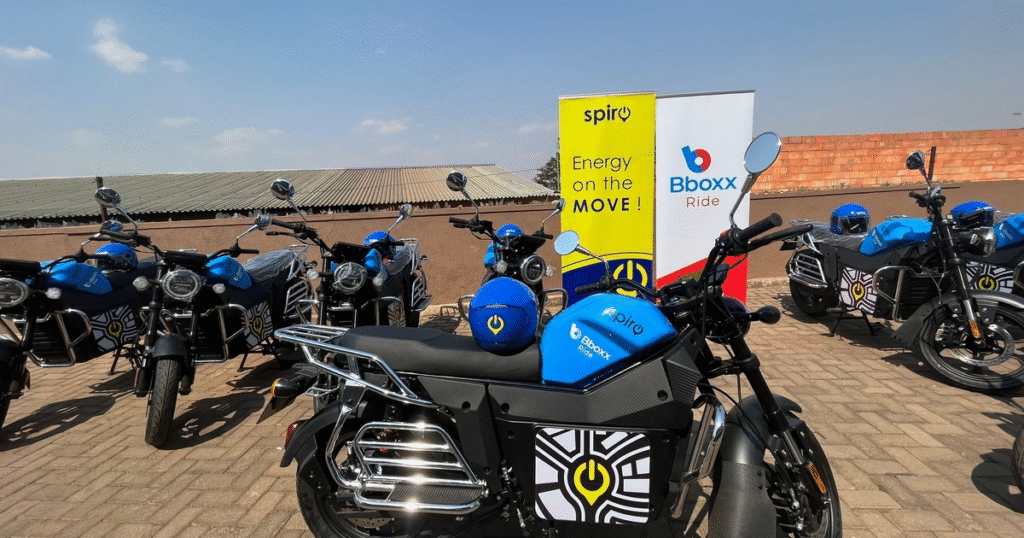Spiro (formerly known as MAuto) is a pioneering electric vehicle (EV) enterprise headquartered in Nairobi, Kenya. Established in 2019, the company is a flagship project backed by the Equitane Group, led by entrepreneur Gagan Gupta. Spiro has positioned itself at the forefront of Africa’s transition to clean mobility, focusing particularly on electric motorbikes and the critical infrastructure needed for their operation, including battery swapping networks. As of 2025, Spiro has extended its operations to six African countries—Togo, Benin, Rwanda, Kenya, Uganda, and Nigeria—demonstrating a strong commitment to combatting fossil fuel reliance and advancing sustainable transportation across the continent. The company is currently led by CEO Kaushik Burman, who brings global expertise in electric mobility.

Product Offering and Technological Infrastructure
Spiro’s electric motorbikes are designed to meet the specific transportation needs of African urban and peri-urban environments. These bikes typically offer a range of 75 to 90 kilometers, depending on the usage conditions and the specific model. The vehicles are powered by rechargeable lithium-ion batteries, which require up to four hours to charge when using conventional charging methods. However, to optimize user convenience and promote mass adoption, Spiro has implemented a battery swapping model. This system enables riders to exchange depleted batteries for fully charged ones at dedicated battery swap stations, many of which are strategically located throughout its operational zones. The infrastructure includes both fast and slow charging points, along with home charging options, ensuring flexibility for users.
Spiro is also making strides in financial inclusivity. In countries such as Rwanda, where access to traditional banking is limited for many citizens, the company has integrated MTN Mobile Money (MoMo card) as a payment solution. This allows unbanked and underbanked individuals to engage with Spiro’s services seamlessly.
Founding, Growth, and Investment Timeline
Since its inception in 2019, Spiro has garnered significant financial backing, beginning with an initial investment of USD 85 million from the Equitane Group, previously known as the Africa Transformation and Industrialization Fund (ATIF). The company’s regional expansion began in earnest in 2022, with successful launches in Togo and Benin.
Spiro’s growth accelerated in May 2023, when it secured an additional USD 63 million in financing from Société Générale. This funding was earmarked for scaling operations in Kenya and Uganda, with the aim of deploying an additional 15,700 electric motorbikes in those countries. That same year, the company expanded its footprint to include Rwanda and Nigeria. Notably, in Uganda, Spiro entered into a strategic partnership with the national government to support the transition of traditional boda bodas (motorcycle taxis) to cleaner electric alternatives.
In 2024, Spiro secured USD 50 million in funding from the African Export-Import Bank (Afreximbank), further enabling its expansion goals. The company’s rising influence and innovative business model earned it a place in the prestigious Time 100 Most Influential Companies of 2024.
Business Model, Strategy, and Achievements
Spiro’s business model is deeply rooted in accessibility, sustainability, and operational scalability. A milestone achievement came in December 2023, when the company reported having successfully completed five million battery swaps at its network of 175 swap stations. By August 2023, Spiro had also established two assembly plants in Benin and Togo, demonstrating its commitment to local value addition and job creation.
To facilitate access to its bikes, Spiro Kenya formed a strategic partnership in January 2024 with Watu Credit, an asset financing company, to provide affordable financing options for potential e-bike owners. The company’s scale continued to rise, and by May 2024, it had a fleet of 14,000 electric two-wheelers and had completed nine million battery swaps across five countries.
Spiro also began aligning with other mobility platforms, partnering with Max, a technology company focused on democratizing vehicle ownership in Africa. This collaboration is intended to boost operational efficiency and expand user access.
In a significant industry development, Spiro surpassed Ampersand, a Kigali-based electric motorbike competitor, becoming the leading e-mobility startup in the African two-wheeler market. In September 2024, Spiro reinforced its manufacturing capabilities by launching a major production facility along Old Mombasa Road in Nairobi, positioning itself as a key player in Kenya’s growing EV manufacturing ecosystem.
Future Outlook and Long-Term Vision
Spiro’s operational scale saw remarkable progress in early 2025, with the company announcing that it had deployed 18,000 electric motorbikes, completed 11 million battery swaps, and facilitated over 428 million kilometers of carbon-free travel. Looking ahead, the company has outlined an ambitious target to have 2 million electric bikes in circulation across Africa by 2030.
To support this vision, Spiro plans to establish two new electric vehicle assembly plants within 2025—one in Kenya, and another in Ogun State, Nigeria—to meet rising demand and strengthen its production capacity across West and East Africa.
In January 2025, Spiro also announced a new partnership with ZOOMe, an electric mobility startup in Nigeria, signaling its intent to deepen market integration and accelerate the electrification of transportation on the continent.


